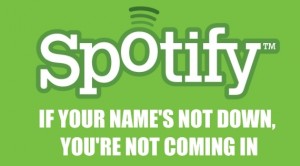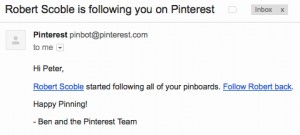Pinterest. Pinterest. Pinterest. Yikes, the noise is deafening. But will the latest social sharing site have legs? In yesterday’s fawning review in The New York Times, David Pogue cites Pinterest’s claim to be:
“…the fastest Web site in history to break the 10-million-visitors-a-month threshold.”
Fortune‘s Dan Primack asks
“How to slow Pinsanity. Nothing gets tech bloggers more hot and bothered than the next new social media thing, and right now that thing is Pinterest.”
Dealbook’s Evelyn Rusli chimed in with this tweet:
And the Wall Street Journal showered the site with a nice feature that rightly asks where’s the money?
“Pinterest’s Rite of Web Passage—Huge Traffic, No Revenue.”
So how did this new darling of the social set catch fire so fast?
I’ll tell you how. The site scours your Facebook friends. It then emails you with the news that one of them is now following you and suggests that you follow them back. (—>)
Here’s the rub: your Facebook friend who “started following all your pinboards” is completely oblivious to the fact that he or she has done so.
You heard me. Pinterest has exploded its user base through a fairly deceptive means of email marketing. Brad McCarty observed this nearly a week ago in his Next Web piece titled
“Pinterest is spamming your Facebook friends’ email with fake connection requests.”
 Look. I get it. Every social startup needs some gimmick to ramp its user numbers. Spotify and Turntable.fm created cache (and demand) through their invite-only schemes. And how long did most of us everyday joes have to wait to get a taste of the “new” Twitter or Google+?
Look. I get it. Every social startup needs some gimmick to ramp its user numbers. Spotify and Turntable.fm created cache (and demand) through their invite-only schemes. And how long did most of us everyday joes have to wait to get a taste of the “new” Twitter or Google+?
But the Pinterest scheme seems, well, a bit sleazy, if not outright unethical. I mean who ever gave the site permission to exploit one’s Facebook friends for its own aggrandizement (and, incidentally, the boffo headlines that resulted)? Is it genius or simply scurrilous?
Didn’t we just hear about Path’s violation of Apple’s TOS by accessing one’s address book data? And today, the Wall Street Journal broke the story of how Google insidiously bypassed the iPhone, iPad’s and Mac desktop’s default settings for Safari that blocked access to one’s browsing history?
After seeing Pogue’s review, I dropped him a note about Pinterest’s Facebook friends scheme. He wrote back saying he hadn’t noticed. I then ran into Buzzfeed’s Jonah Peretti just before he was to take the stage for his Social Media Week keynote yesterday. We chatted about Ben Smith’s success in migrating his tens of thousands of Twitter followers from Politico to Buzzfeed. I then mentioned the remarkable hype around Pinterest and my observations about what’s actually feeding that hype.
I attributed it to the questionable email marketing scheme and asked why he thought people weren’t more vocal about this nefarious approach. He responded that unlike another startup that pushed the ethical bounds of email marketing — Plaxo — people actually like using Pinterest, and because of that, are willing to give it a pass.
OK People. Pin on!




Pinterest totally fooled me. I honestly thought that everyone was following me so I had to follow them back – even though I thought it was a little weird that some people I barely know decided to follow my boards. But it’s true, I love pinterest, so I’m not too mad about it. Guess it just goes to show that if people like your product, then you can get away with streching the boundaries on how you get users. If people don’t, well, then you’ll be in for some trouble.
justessay.com
<span><span><span><span>awesome</span></span></span></span><span><span><span><span> </span></span></span></span><span><span><span><span>much!</span></span></span></span>